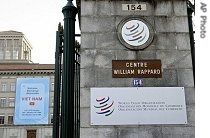-
(单词翻译:双击或拖选)
By Matt Steinglass
Hanoi
11 January 2007
Vietnam's accession to the World Trade Organization became official on Thursday. The event is a milestone1 in a long transition for Vietnam, which is shifting from a command to a market economy, and from isolation2 to international openness and globalization. Matt Steinglass has more from Hanoi.
 |
| Vietnam is welcomed as 150th member of WTO on giant poster over entrance of WTO headquarters in Geneva, 11 Jan 2007 |
Nguyen Thi Bich, director of international relations at Vietnam's Ministry4 of Finance, says the move means tariffs6 on many categories of goods imported into Vietnam have been slashed7.
Bich says Vietnam had committed to reduce tariffs on 1,800 categories of goods, but would actually cut even more than that. She says average tariffs will drop from about 17 percent to 14 or 15 percent for now.
Further reductions over the next few years will bring tariffs on some goods, including information technology products like computers, down to close to zero.
Exporters are eager to gain access to Vietnam's increasingly wealthy consumers. American companies already enjoyed low tariffs on some goods through the U.S.-Vietnam bilateral8 trade agreement, or BTA.
But trade expert Shiumei Lin, of the U.S.-Vietnam Trade Council, says many new tariffs are even lower than under BTA - and they apply to some products, such as pork, which Vietnam once considered too sensitive to open up.
"For example, the [new] pork tariff5 is pretty low, I think it's 15 percent," she said. "Whereas pork was not negotiated at all under the BTA It was considered a sensitive product, so it wasn't negotiated."
But for importers, reduced tariffs are only part of the story.
"What is more important than the tariffs, even, is the fact that Vietnam's entire trade regime is reformed … There's a whole list of laws that they've had to rewrite in order to qualify for WTO accession today," said Lin.
For Vietnamese consumers, that may mean more choice of foreign products. Tariffs on imported televisions, for instance, dropped from 50 percent to 40 percent Thursday, and will eventually drop to 20 percent.
Economist9 Vivek Suri of the World Bank's Hanoi office says consumers won't see many immediate10 price cuts, but over the long run, they will benefit.
"It's not only price reductions that matter, it is the quality of the goods that matter as well," he said. "So perhaps you might not see price reductions, but you might see a greater variety of goods coming into the country, and of a superior quality."
For many Vietnamese, joining the WTO is about more than economics. During the country's wars against France and the U.S., the country was isolated11 from the global community.
That isolation deepened after the Vietnam War ended in 1975, when the U.S. and other countries cut diplomatic relations and boycotted12 Vietnamese trade. WTO accession is seen as the latest step in a long process of what the Vietnamese call "hoi nhap", or "integration13".
Dung Trung Quoc, a historian and a member of Vietnam's National Assembly, says joining the WTO represents a return to normality for Vietnam. He says the country's long wars, despite their victorious14 endings, created abnormal ways of thinking, which made it harder to integrate with the rest of the world, and to accept normal values like the market economy.
Such problems persisted even after Vietnam turned to the market economy in 1986. Nguyen Tran Bat founded Vietnam's first business consulting company in the late 1980s. He says in the early 1990s, even Vietnamese who worked with foreign companies were suspicious of the capitalists.
Bat says Vietnamese working in joint-stock companies formed an all-Vietnamese club to exchange information on how to protect themselves against their foreign investors15.
Today, habits like those are largely a thing of the past. Young Vietnamese don't think of capitalism16 as a foreign imposition, but simply as the way most of the world does business.
In mid-December, 400,000 Vietnamese turned out for parades in Hanoi and Ho Chi Minh City celebrating the country's admission to the WTO.
They weren't celebrating cheaper consumer electronics. They were celebrating Vietnam's struggle to become a normal country - one whose exports are expected to rise by 20 percent this year.
 收听单词发音
收听单词发音
1
milestone

|
|
| n.里程碑;划时代的事件 | |
参考例句: |
|
|
|
2
isolation

|
|
| n.隔离,孤立,分解,分离 | |
参考例句: |
|
|
|
3
negotiations

|
|
| 协商( negotiation的名词复数 ); 谈判; 完成(难事); 通过 | |
参考例句: |
|
|
|
4
ministry

|
|
| n.(政府的)部;牧师 | |
参考例句: |
|
|
|
5
tariff

|
|
| n.关税,税率;(旅馆、饭店等)价目表,收费表 | |
参考例句: |
|
|
|
6
tariffs

|
|
| 关税制度; 关税( tariff的名词复数 ); 关税表; (旅馆或饭店等的)收费表; 量刑标准 | |
参考例句: |
|
|
|
7
slashed

|
|
| v.挥砍( slash的过去式和过去分词 );鞭打;割破;削减 | |
参考例句: |
|
|
|
8
bilateral

|
|
| adj.双方的,两边的,两侧的 | |
参考例句: |
|
|
|
9
economist

|
|
| n.经济学家,经济专家,节俭的人 | |
参考例句: |
|
|
|
10
immediate

|
|
| adj.立即的;直接的,最接近的;紧靠的 | |
参考例句: |
|
|
|
11
isolated

|
|
| adj.与世隔绝的 | |
参考例句: |
|
|
|
12
boycotted

|
|
| 抵制,拒绝参加( boycott的过去式和过去分词 ) | |
参考例句: |
|
|
|
13
integration

|
|
| n.一体化,联合,结合 | |
参考例句: |
|
|
|
14
victorious

|
|
| adj.胜利的,得胜的 | |
参考例句: |
|
|
|
15
investors

|
|
| n.投资者,出资者( investor的名词复数 ) | |
参考例句: |
|
|
|
16
capitalism

|
|
| n.资本主义 | |
参考例句: |
|
|
|















